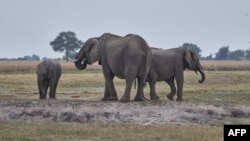Botswana is hosting delegates from 33 African elephant range states for talks on the trade in live elephants. They are also seeking a common position as Africa battles increasing elephant populations in some areas, while the numbers decline elsewhere on the continent.
Botswana’s environment and tourism minister, Nnaniki Makwinja, said Africa must speak with one voice despite the peculiar challenges each region faces.
"We are cognizant that the challenges that we face are diverse and there is no silver bullet to address these challenges,” Makwinja said Monday during the opening of the four-day meeting. “We call upon these countries to engage with us before they adopt measures that may undermine our efforts to conserve our wildlife heritage and sustainable development goals.”
In 2022, delegates from Africa attended talks in Panama on the Convention on International Trade in Endangered Species of Wild Fauna and Flora, or CITES. They were divided over elephant management.
Southern African nations want CITES to relax measures on elephant trade, but some parts of the continent, particularly the eastern and western areas, want stricter controls.
Dan Challender, a conservation scientist on the wildlife trade based at the University of Oxford, said this week’s meeting in Botswana might not address all concerns given the uneven distribution of the animals across the continent.
“The meeting provides an opportunity for African countries to come together and discuss trade in African elephants. I would expect them to find common ground on some issues but not all, recognizing the different status of the species and policy environments across the continent,” Challender said.
The meeting is open to governments, but non-profit conservation organizations are not invited.
Local conservationist Isaac Theophilus of the Botswana Wildlife Producers Association said delegates from countries that oppose trade in elephants should get a chance to see the impact of human-wildlife conflict.
“We have two opposing blocks that will be seated around the same table to look at issues relating to elephant management,” Theophilus said. “My hope and wish is that those states attending would have an opportunity to interact with people in the (wildlife) area and get firsthand information relating to problems associated with living with an increasing elephant population.”
Veterinarian and wildlife management expert Dr. Eric Verreynne said trade in live elephants poses logistical challenges.
"Transporting elephants from one country to another brings with it some challenges. Most of these challenges relate to logistics,” Verreynne said. “They are bulk animals; it's very, very expensive to transport. When you talk about females and calves, you have to take your family groups in one. The capacity to transport large numbers of elephants is limited."
Africa’s elephant population is estimated at 415,000, with more than half of the number living in southern Africa.




